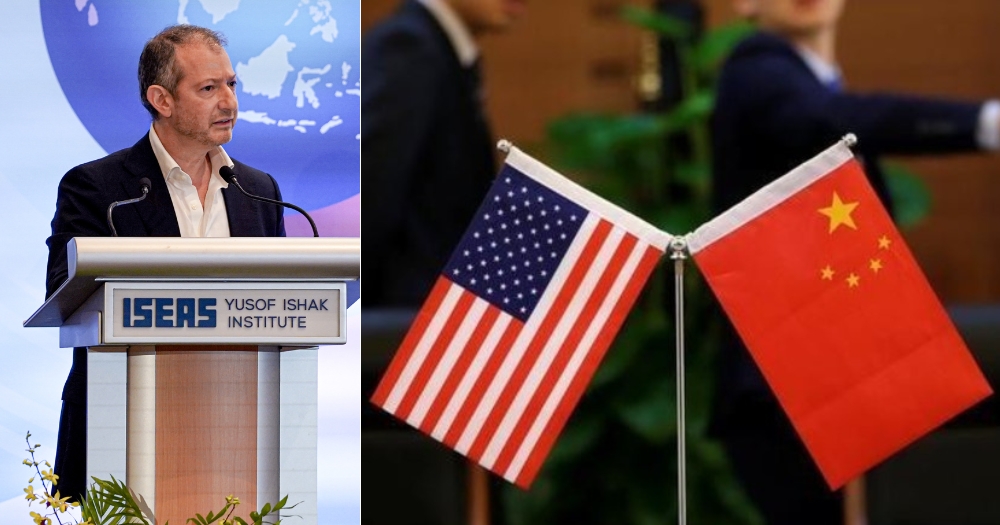The relationship between the United States (U.S.) and China is no longer in "free fall" and is now "more stable", Evan Feigenbaum said at the ISEAS – Yusof Ishak Institute's Regional Outlook Forum (ROF) on Jan. 10, 2024.
 Image by Keyla Supharta.
Image by Keyla Supharta.
However, Feigenbaum was quick to add that he would not call the state of relations between the two a "stable equilibrium", nor does he see it heading in that direction anytime soon due to structural, as well as political reasons.
Feigenbaum, who is the Vice President for Studies at the global think tank Carnegie Endowment for International Peace, explained this by focusing on securitisation — security competition between the U.S. and China.
'Securitisation of basically everything'
Securitisation, while not new, has become the central strategic dynamic in the 30 or so years since Feigenbaum began working on the U.S.-China relationship, he said.
He went so far as to call the U.S.-China relationship "the securitisation of basically everything" during the panel session on U.S., China and Japan's geopolitical currents.
He said "nearly everything" in the U.S.-China relationship has collapsed in the last seven years or so, where securitisation has extended beyond traditional security concerns and encompassed various non-security aspects, such as economic ties, and is now being refracted through the prisms of national security.
"Flows of capital, people of data, and especially technology, are increasingly viewed on both sides, and particularly on the American side, as national security issues not simply as commercial issues," Feigenbaum added.
U.S. competition with China
To combat this, the U.S. is increasingly making strategic competition with China its official strategy in its policies, and this includes limiting, or even imposing export controls.
Feigenbaum said the U.S. approach — securitisation of everything — has "pernicious" effects, namely a zero-sum logic to the U.S.-China relationship with a focus on competition over collaboration.
"And what I find, if I can use a mathematic analogy, is for most countries in the world the mathematical operations that matter are addition and multiplication, not subtracting.
When you show up as the United States, if you're talking about subtraction and division — less China, more of this — that's not necessarily in the interest of most countries in the world."
Feigenbaum said this would bring about a crisis for the U.S. as people are expecting, and are afraid, that the U.S. might be turning inward.
U.S. competition with China
Xiang Lanxin, who was also one of the panellists during the session, said he does not have "too much disagreement" with Feigenbaum's speech.
Xiang is the Professor Emeritus of International History and Politics at the Graduate Institute of International and Development Studies (IHEID) in Geneva.
 Image by Keyla Supharta.
Image by Keyla Supharta.
Xiang added on Feigenbaum's speech, saying that today's U.S.-China competition is leaning more towards, and perhaps even entering, the dangerous territory of military confrontation.
He used his speech to talk about what he said worries him the most — the two major powers' signalling and messaging, particularly with regard to the "One China Policy".
The One China Policy is US' diplomatic acknowledgement of China's position that there is only one Chinese government.
China's ruling Chinese Communist Party (CCP) says that Taiwan is an inalienable part of China.
Xiang said he believes that Beijing seems to be convinced that the U.S. is "not necessarily pursuing" the One China Policy but "really wants" instead the One China, One Taiwan policy, which he said is currently "the reality, the status quo".
The problem, Xiang said, is the U.S.' perpetuating the One China, One Taiwan policy by making claims like China's possible invasion of Taiwan, and President Joe Biden's "tongue slip" incidents when he said that the U.S. is committed to defending Taiwan, before U-turning on his earlier statement.
Xiang described the U.S. messaging and language as "totally unnecessary and dangerous", especially since he "does not believe that Xi Jinping even has a specific plan", and could result in a "very, very, very dangerous situation".
Top image by Keyla Supharta and from World Economic Forum

If you like what you read, follow us on Facebook, Instagram, Twitter and Telegram to get the latest updates.



